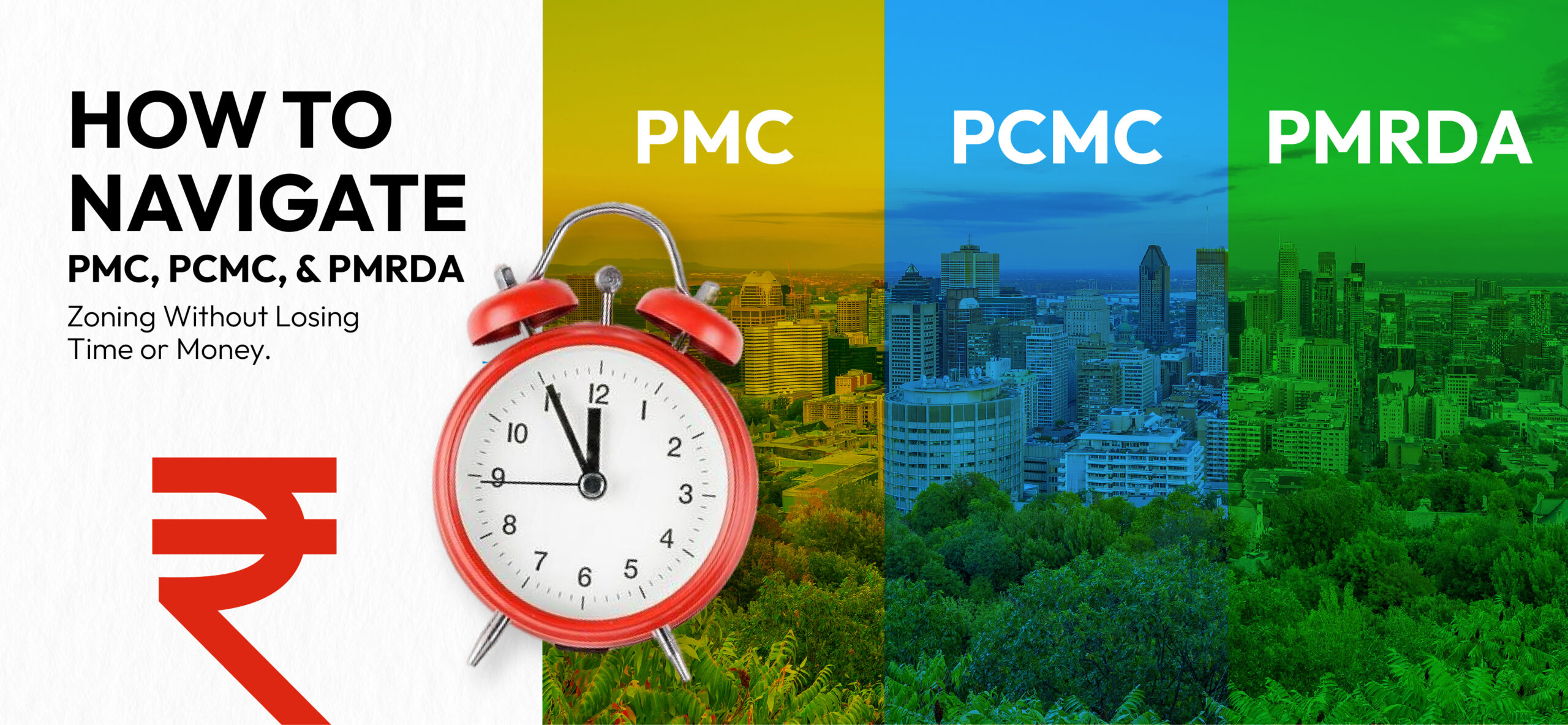How to Navigate PMC, PCMC, and PMRDA Zoning Without Losing Time or Money

The Real Estate Developer’s Guide to Pune’s Zoning Rules and Authorities
If you’re a real estate developer in Pune, you already know one thing – zoning laws aren’t just technical paperwork. They’re make-or-break decisions that can save or cost you crores.
From layout sanction to final CC approval, every phase of development is deeply tied to understanding land use, jurisdiction, and compliance norms.
This guide simplifies it all: PMC rules, PCMC approval process, PMRDA zoning, and everything in between, so you can make better, faster, and more profitable decisions.
Zoning Pitfalls That Developers Commonly Overlook
Even experienced developers can miss critical zoning nuances that lead to expensive corrections and approval delays. Here are some common mistakes to watch out for:
Assuming FSI Is Uniform Across the Plot
- In PMRDA zones or village gaothan extensions, FSI may vary across a single land parcel. Always verify plot-level zoning through sanctioned DP or village maps.
Ignoring Reservation or Buffer Zones
- Some plots may have reservations for public use (schools, roads, amenities) or fall under buffer zones like floodlines or hilltop/hill-slope zones, rendering a portion non-developable.
Starting Design Work Before Zoning Confirmation
- Investing in architecture or branding before confirming land use and jurisdiction leads to rework. Always secure the zoning certificate before engaging consultants.
Overlooking Setback, Road Width, and Height Restrictions
- Zoning not only dictates FSI, but also maximum permissible height, front/rear setbacks, and required access road width—especially in PMC and PCMC.
Forgetting to Revalidate Old Approvals
- If you’re reviving a shelved project or purchasing land with lapsed approvals, check if the layout sanction, IOD, or CC approval needs to be renewed as per the latest DCPR Pune.
Zoning Categories: Know the Ground Reality
Before a brick is laid or a plan is drawn, check the zoning certificate. Pune’s land parcels are regulated by the DCPR Pune (Development Control and Promotion Regulations), which categorize land under:
- R – Residential
- C – Commercial
- I – Industrial
- NDZ/Green Zones – Restricted or No Development
Getting this wrong can derail your timelines. Attempting to change zoning post-purchase can be legally complicated and financially draining. Pull your zoning certificate early, and this one step protects your entire investment.
Who Governs What? Understanding Jurisdiction
There’s no single authority for the Pune Metropolitan Region. The area is divided across:
- PMC – Covers city areas like Kothrud, Shivajinagar, Hadapsar, Baner
- PCMC – Encompasses Wakad, Pimpri, Chinchwad, Nigdi
- PMRDA – Manages the rapidly urbanizing outskirts: Sus, Mahalunge, Maan, Urse, Wagholi
Each has its own process for project approvals, different timelines, and unique FSI calculations for Pune. What’s valid in PMC may not fly in PMRDA. So, before your team drafts a project vision, ensure your site falls under the correct authority and plan accordingly.
Key Regulatory Approvals and Certificates
Navigating Pune’s approval process requires familiarity with multiple clearances and documentation, including:
- Layout Sanction – Mandatory first step for master planning
- Environmental Clearance (EC Pune) – Required for development over 20,000 sq. m.
- Building NOC – Varies by department: Fire, Airport, Forest, etc.
- IOD Certificate (Intimation of Disapproval) – Indicates deficiencies to fix before Commencement Certificate (CC Approval) is granted.
- STP Norms & Green Norms – Mandatory compliance before Completion Certificate
Incomplete or incorrect submissions often send files to the bottom of the queue. A clean file, supported by the right zoning consultant, can save months in rework.
TOD Zones and Metro FSI Benefits
If your land falls within a 500-metre radius of a metro station, you may qualify for TOD benefits. This includes:
- Higher Metro FSI (up to 4.0 in some cases)
- Permissions for mixed-use development (residential + retail + commercial)
- Improved ROI due to high footfall and public transport connectivity
TOD zones currently apply to Metro Phase 1 areas (Vanaz to Ramwadi, PCMC to Swargate). However, eligibility requires compliance with additional urban design norms, such as wider footpaths, open spaces, and transit support infrastructure.
Always confirm using official TOD zone maps 100 metres can be the difference between 2.5 and 4.0 FSI.
Stay Ahead of Zoning Trends
Zoning is not static. It adapts to urban planning, politics, and infrastructure upgrades. Key trends include:
- Riverfront Redefinition – As part of Pune’s River Rejuvenation Plan, PMC rules are being redrawn to change floodline margins.
- MIDC Relaxation – Certain land use in Chakan and Talegaon is opening up to IT/commercial applications.
- Village Urbanisation – Areas like Sus, Bhugaon, Wagholi and Maan are transitioning from rural to urban, impacting FSI Pune, access roads, and zoning codes.
Smart developers track rezoning notices, land use policy changes, and objections during the planning phase to avoid project delays or missed opportunities.
Green Compliance Is No Longer Optional
With environmental concerns rising, solar compliance, green norms, and eco-sensitive planning are now embedded in Pune’s approval ecosystem.
Key requirements include:
- Rainwater Harvesting – Mandatory under PMC rules, with a 10% tax rebate for compliance.
- On-site STP Norms – No CC approval without a functioning sewage treatment plant.
- Waste Segregation & Composting – Required under PCMC’s Green Society norms.
- Solar Water Heating & LED Lighting – 10% of communal energy must be met through renewable sources.
Failing to integrate these early on will halt your Completion Certificate, delaying handovers and cash flows.
The Role of Legal and Zoning Consultants
A good zoning consultant or legal advisor isn’t just a support function—they’re your risk-mitigation partner.
They can help with:
- Accurate zoning interpretation
- Managing IOD certificates, building NOCs, and compliance issues
- Guiding rezoning or change-of-land-use applications
- Coordinating across PMC, PCMC, and PMRDA for projects on border zones
- Drafting replies to objections and managing compliance hearings
Their insight prevents errors that might cost months—or crores—in lost time and red tape.
On the final note
Zoning may look like a back-end process, but it’s your first line of control in planning a profitable, on-time launch. At BeyondWalls, we don’t just understand this; we embed it into your entire development journey.
With 15+ years in real estate marketing and 300+ experts, we partner with developers to navigate Pune zoning challenges, get faster project approvals, and plan for maximum FSI and feasibility right from Day 1.
Whether you’re evaluating land, planning approvals, or tracking policy shifts, our expert guidance helps you stay ahead of the curve. With a deep understanding of PMC, PCMC, and PMRDA frameworks, we ensure you always have the clarity and confidence to build right on time, within scope, and with reduced risk.
Want more such insights on real estate?
Thank you. Your comment will be visible after an approval.
Comments (0)
No comments found.






Add your comment